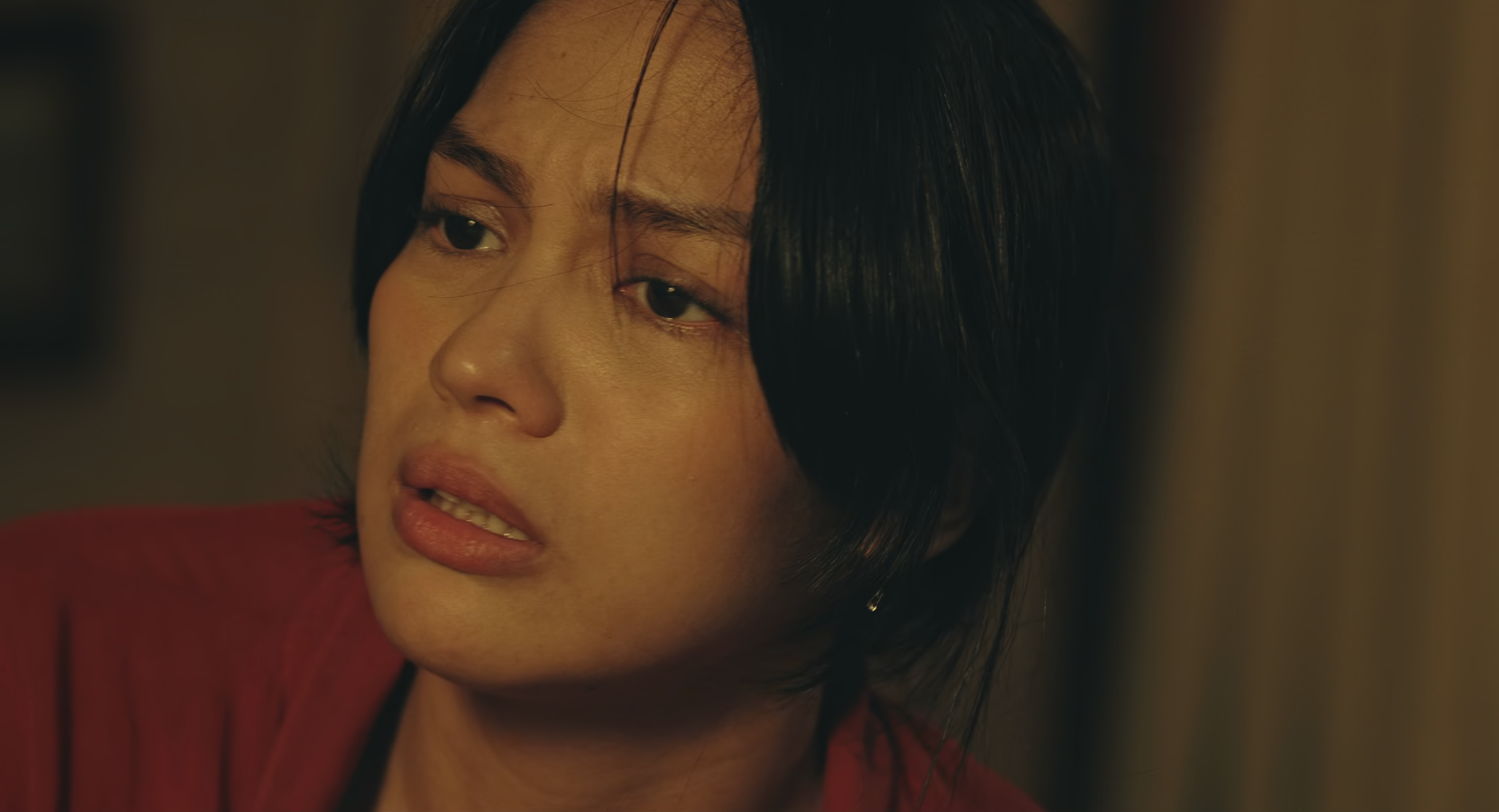Movie Reviews
Stream It Or Skip It: ‘Paradise’ on Netflix, a Dystopian Sci-fi Thriller from Germany

German sci-fi thriller Paradise (now on Netflix) asks the tantalizing question: What if time was money? And not in the old-adage, metaphorical sense, but literally? Director Boris Kunz’s film establishes a not-too-far-off future society where people can sell or donate actual years from their lives, years that others can use to prolong their own lives. As always is the case with high-concept fodder, the question is whether the premise holds up under scrutiny – or at least paints over an absurd concept with some compelling drama and/or action.
PARADISE: STREAM IT OR SKIP IT?
The Gist: We meet Max (Kostja Ullmann) as he gives a young man, maybe in his late teens, a hard sell: Give up 15 years of his life in exchange for €700,000. Think of everything you could do with that money, Max says. Your family would no longer be poor and living in a hovel, your father could start a business, and all that. The kid agrees, and Max makes his way from the area on the wrong side of the tracks – it looks like the urban hell of Children of Men or Beau is Afraid – past armed guards and fences and to the other end of the socio-economic spectrum, where the streets are clean and non-chaotic. Another day, another deal for Max’s employer, Aeon, for whom he’s brokered 276 years, earning him a salesman of the year award from CEO Sophie Thiessen (Iris Berben). Then he goes home to his fancy-ass apartment for dinner and oral sexytimes with his wife Elena (Marlene Tanczik), who’s a doctor, a profession that, in this timeline, is a lot like teachers in our own in that they’re essential cornerstones of society who earn a shekel or two more than diddly-squat. Meanwhile, leaders of a counter-Aeon movement target Thiessen, committing murderous acts of terrorism against de-aged people. Consider the dystopia established!
Max and Elena visit her parents for dinner. Her father isn’t so sure about Max’s moral values, and debates him. It’s obvious that what Max and Aeon do is awful, ripe for corruption and only deepens the divide between the haves and the have-nots. We’re all thinking it: What kind of creep does this? But Max delivers a quality-over-quantity argument and then he and Elena go home to find their apartment in flames. The insurance company says someone left a candle burning so they’re not paying up and our protags are on the hook for €2.5 million right now. And you thought insurance companies couldn’t get any worse! Of course, they don’t have that kind of money, and this is where we learn that banks could actually get worse, too: In order to acquire the apartment, Elena put down 40 years of her life as collateral. And now it’s time to collect.
For Max, this is a lesson in, you know, whaddayacallit, irony. Big, fat, flaming-hot-cheeto irony. This is when we see the procedure: Elena is strapped in a chair and three needles are inserted into her side. That’s it. Anticlimactic, ain’t it? Then she goes home and over the course of some unspecified amount of time that’s significantly less than 40 years, she ages 40 years, and is now thankfully not played by Tanczik in old-lady makeup or with a CGI’d face, but Corinna Kirchhoff. At this point, we learn a few things that really get the plot rolling: The procedure can be reversed. The donor and the recipient need to have a DNA match in order for it to work. There are black-market firms in Lithuania that’ll perform the procedure. And Sophie Thiessen over there – is it me, or does she look younger now? Like, 40 years or so, if I had to guess. THE PLOT THICKS.

What Movies Will It Remind You Of?: Paradise covers similar conceptual territory as In Time, and it also has the look and feel of Gattaca’s future dystopia. (Notably, both of those movies are directed by Andrew Niccol.)
Performance Worth Watching: Tanczik and Kirchhoff provide a sturdy emotional foundation to a film that barely has room for such a thing.
Memorable Dialogue: Elena’s jokey mantra she repeats, re: any moral compromise she made marrying Max: “I love him despite his being a small cog in the capitalist machine.”
Sex and Skin: Max has no problem whatsoever going down on Young Elena or Old Elena. That’s love!
Our Take: Paradise – nonsense title, by the way – has the trappings of a movie ripe for an English-language remake populated by a couple of A-listers. And for once, it’d be worthwhile, since there’s plenty of room for improvement here. Plenty. Conceptually, it’s absurd in a pragmatic sense (the movie’s all the better for not even attempting to explain the science behind it) but philosophically compelling: What makes for a more valuable life, the length or the girth? I don’t have a good answer for that, which is grist for the mill of contemplation.
But instead of exploring this idea in a thoughtful manner, Paradise is a raging mediocrity that devolves into formulaic drivel: kidnapping, shootouts, dopey twists, that old scene where our on-the-run protagonists find a random car that inevitably has the keys in it because if it didn’t the plot would come to a screeching halt, etc. There’s even a scene where a character nearly dies after sinking into quicksand. Quicksand! Shut up with the quicksand! When’s the last time we saw that demon quicksand in a movie? The ’50s? The movie accidentally comments on itself when a character utters amidst all the hoopla, “There has to be another way than this free-for-all.”
Visually, the film is competent but mundane, its moody colors and lighting and boilerplate action sequences lifted from dozens of dystopian brouhahas before it. Although Kunz and a small pile of screenwriters work in a modicum of world-building, they mostly shun the implications of this society for action-thriller cliches. There’s little attempt to dig deeper into Max, who’s been sliding down a slippery ethical slope and now finds himself trying to climb back up, and Elena is rarely more than a plot device. And the third act is monumentally dumb, just one eyeroll after another after another. Paradise is a classic case of decent concept/lousy execution.
Our Call: How much is two hours of your life worth? SKIP IT.
John Serba is a freelance writer and film critic based in Grand Rapids, Michigan.

Movie Reviews
Love Child (2024) Movie Review & Ending Explained: Can Love and Sacrifice Keep Ayla and Paolo’s Family Together?

Rom Coms, the ones that match the endearing and intelligent with equal fluency, have a scintillating flavor. The book of tricks to make a romcom sing and soar may have admittedly gone jaded and dog-eared. The crises of couples, dilemmas, and anxieties they have to battle have undergone dramatic changes in a fast-evolving world. Expectations vary with the decades, even as gendered rules haven’t dented much.
The urge to steal a leaf or two from every standard template Hollywood romcom is immanent in any new derivation. It becomes a constant tussle, hence, for a new film in similar spaces to eke out freshness and smarts. Jonathan Jurilla’s directorial “Love Child” (2024) has little to add or say anything genuinely sparkling. It’s a weary distillation of parental exhaustion and re-alignment, too silly to pass off what it views as clever self-reflexive remarks.
There are basic cardinal rules a romcom must ensure is upheld. Conflicts should ideally resonate across a demographic; humor needs to exist in spades. A helping of self-awareness goes a long way in establishing a winking playfulness. The best rom-coms sail through these assumptions with lightness and spryness.
Love Child (2024) Plot Summary & Movie Synopsis:
Ayla and Paolo’s Journey of Love, Sacrifice, and Resilience
Ayla (Jane Oineza) and Paolo (RK Bagatsing) are young parents. Incidentally, the actors themselves are a couple in real life, who call the film a “free trial” to parenthood. Ayla and Paolo have been exultant about becoming parents but what awaits them is a whole lot of instability, fraught periods of testing faith in each other to weather the hardships of raising their child, Kali (John Tyrron Ramos) who is diagnosed with autism. It’s this diagnosis that opens the film and sends their lives into a tailspin. The two have fought with their families on several counts to realize their togetherness. Dreams have also been put on hold. Paolo is a filmmaker who desires to make it big but naturally meets resistance from his father, from whom he has cut loose.
They arrive in the Philippines to put up at the house that Ayla’s aunt has offered. They don’t have to worry about rent, an exponential anxiety hence taken care of. The first thing they get done is to enroll Kali at a school for children with support needs. They hope he can be addressed with due attention and be given proper time, nourished in a safe, loving, and understanding community.
How Far Will Ayla and Paolo Go to Secure a Future for Their Son?
Of course, things don’t go as smoothly. The money to raise the child is immense, formidable, and persistent. It’s no small task. To exacerbate matters, the couple has no savings to lean on. Ayla has just a small income from a virtual assistant job and Paolo has barely any gigs to draw a livelihood from in the Philippines.
At home back in Australia, opportunities were, at least, higher. Sources of supporting themselves stand a chance. The couple start a coffee cart as an added source of income. Even that isn’t enough. Customers are few. To run the cart is its own demanding affair that strains their purses more than they expected it to.
One night, Kali falls terribly sick. His parents rush him to the hospital, where medical expenses surge. Where will the couple find the money to foot the bill? They are at wit’s end. Pao assures Ayla not to worry. He’ll dredge out a way. However, when he is away scavenging for a source, Ayla already turns to her mother who lends her the needed money. He is angry with her because Ayla’s mother has been refusing to recognize Kali as her grandson. She tells him, if they waited longer, they’d be staring at an added day of hospital expenses.
Love Child (2024) Movie Ending Explained:
Do Ayla and Paolo find a way of raising their child?

Ayla and Paolo are compelled to employ specialized teachers and attendants for Kali. The cost of living becomes exceedingly high. How can they afford it? Ultimately, they edge toward the pained but necessary realization that they have to live apart at least for a while. If that’s the only way they can build a decent future for Kali, they can’t ignore it. What’s significant and decisive is both Ayla and Paolo are wholly committed to being there for Kali, no matter what it takes, as well as underscoring the need to go out and chase their individual aspirations.
Yes, she must pursue her dream of being a lawyer. The climax is a wistful one, with Paolo leaving for Australia where he would brush aside his bruised ego and accept his father’s job offer. He takes the marks of his wife and child, remnants of them he’d carry with him as he moves into an uncertain, yet hope-tinged future in Australia. They part ways with a promise of return. They know he’ll be back when the time is right and resources have accrued enough to carve for them a comfortable life together.
Love Child (2024) Movie Review:
“Love Child” lacks a fundamental, driving vitality and energy. It is only inconsistently curious and sporadic in its plunges into human indecision and the fear of failure. What is that projection we induce when we feel we are turning into reflections of our parents, a reality most horrific and to skirt clear? To encounter such a realization is depressing and upsetting.
The central pair of the film have to negotiate and move past reservations and a bundle of fears popping up. They are opposed to seeking the help of their parents, who have never sided with them in big decisions, but they also understand the need for a bigger family their child ought to have. Having just his parents wouldn’t suffice for Kali to rely on. For his sake, the parents have to look past their grudges and learn to forgive and let go of ill will.
Read More: 15 Best Netflix Original Horror Movies
It’s a question of need and learning to trust again those who have failed us, giving them another chance without being bogged down by ego and justified anger and disappointment. But the film never pads this vital realization of the parents well to land its ultimate point. “Love Child” dwells lightly on vast conflicts as these, papering them over with a convenient switch.
This is why the hardship and everyday strife don’t hit as deeply as they ought to. “Love Child” leaves you pining for a more textured understanding of the complex bonds of care between the couple and their child, who is bereft of any dimension other than his support needs. The film takes a blinkered, dull view and yet bungs in a slapdash discovery of the importance of a larger family.
Love Child (2024) Movie Trailer:
Love Child (2024) Movie Links: IMDb, Rotten Tomatoes, Wikipedia, Letterboxd
The Cast of Love Child (2024) Movie: RK Bagatsing, Jane Oineza, John Tyrron Ramos, Milton Dionzon, Mai-Mai Montelibano, Jaden Biel Fernandez, Chart Motus, Mary Jane Quilisadio, Mandy Alonso, Tey Sevilleno
Love Child (2024) Movie Runtime: 1h 40m, Genre: Drama
Where to watch Love Child
Movie Reviews
Movie Review | Bleakness of Iceland adds to horror tale

Despite the so-so storytelling, the work here by Palsson piques your interest as to what the native Icelander will make in the future.
Subscribe to continue reading this article.
Already subscribed? To login in, click here.
Originally Published:
Movie Reviews
The Girl with the Needle (2024) – Movie Review

The Girl with the Needle, 2024.
Directed by Magnus von Horn
Starring Vic Carmen Sonne, Trine Dyrholm, Besir Zeciri, Ari Alexander, Per Thiim Thim, Joachim Fjelstrup, Ava Knox Martin
SYNOPSIS:
Copenhagen 1919: A young worker finds herself unemployed and pregnant. She meets Dagmar, who runs an underground adoption agency. A strong connection grows but her world shatters when she stumbles on the shocking truth behind her work.

A fairytale retelling of one of Denmark’s most shocking crime cases, The Girl with the Needle blends dreamlike expressionism with an earthly realism that conveys emotional intensity at its most raw.
The film traces the terrible experiences of Karoline (a fantastic Vic Carmen Sonne), an unemployed, single, pregnant woman in post-World War One Denmark. Her husband went missing during the war and she has had no word. With her emotional and mental fragility already stretched to the point of breaking, she finds herself without a job. An unhappy tryst with a manipulative and emotionally immature man leaves her pregnant with no support and little hope of improving her situation.
Into this bleak environment steps a beacon of hope in the shape of Dagmar (Trine Dyrholm), a charming woman who organises an underground adoption agency that helps mothers in trouble find foster homes for children who are either unwanted or unable to be taken care of.

Karoline and Dagmar form a strong bond, and the young mother takes on the role as a wet-nurse at the agency. However, all is not what it seems. Beneath her charismatic veneer, Dagmar holds a horrifying secret. When Karoline stumbles upon this secret, her entire world, and that of Copenhagen society as a whole, is completely turned upside down.
Things are complicated even further when a disfigured man claiming to be Karoline’s lost husband shows up on the streets looking for his wife.
This element delves deep into the stylistic inspiration for the look of this gripping and grim tale. The soldier has had half of his face destroyed and has been given a mask to wear that conjures up ideas of opera phantoms and classical villains. As it is, the man is kind and considerate, in stark contrast to the handsome rich young character whom Karoline had a brief dalliance with. The wounded soldier is forced to join a travelling circus as a living exhibit, and Karoline out of sheer desperation takes a needle to herself in a public bathhouse in attempted termination.

It is here that she meets Dagmar and from there, the story becomes even more horrible. Based on a true story and embellished with nightmarish but wholly believable touches, The Girl With the Needle is an immersive and uncomfortable viewing experience. Scenes are artistically framed, and the whole production is touched with morbid curiosity and fear-fueled adrenaline. Both leads are excellent in their respective roles with the fictionalised character of Karoline given personality and furious life by Carmen Sonne.
The backstory of the true character of Dagmar is necessarily kept out of the script, meaning that Dyrholm must subtly bring out the ambiguities and strangeness of her spirit in subtle and skilled ways. She succeeds brilliantly, and thanks to it, the film takes on a haunting and monstrous quality that lingers on long after the credits roll.
Flickering Myth Rating – Film: ★ ★ ★ ★ ★ / Movie: ★ ★ ★
Robert W Monk
https://www.youtube.com/watch?v=embed/playlist
-

 Health1 week ago
Health1 week agoNew Year life lessons from country star: 'Never forget where you came from'
-
/cdn.vox-cdn.com/uploads/chorus_asset/file/24982514/Quest_3_dock.jpg)
/cdn.vox-cdn.com/uploads/chorus_asset/file/24982514/Quest_3_dock.jpg) Technology1 week ago
Technology1 week agoMeta’s ‘software update issue’ has been breaking Quest headsets for weeks
-

 Business5 days ago
Business5 days agoThese are the top 7 issues facing the struggling restaurant industry in 2025
-

 Culture5 days ago
Culture5 days agoThe 25 worst losses in college football history, including Baylor’s 2024 entry at Colorado
-

 Sports5 days ago
Sports5 days agoThe top out-of-contract players available as free transfers: Kimmich, De Bruyne, Van Dijk…
-

 Politics3 days ago
Politics3 days agoNew Orleans attacker had 'remote detonator' for explosives in French Quarter, Biden says
-

 Politics3 days ago
Politics3 days agoCarter's judicial picks reshaped the federal bench across the country
-

 Politics2 days ago
Politics2 days agoWho Are the Recipients of the Presidential Medal of Freedom?






:max_bytes(150000):strip_icc():focal(770x269:772x271)/abbie-stockard-miss-america-orlando-010625-3-1b845fcc45354518b6ad5346c88236d3.jpg)
:quality(70)/cloudfront-us-east-1.images.arcpublishing.com/adn/RQGAA7VDAJA7LDNXJLOHEDDWUU.jpg)











